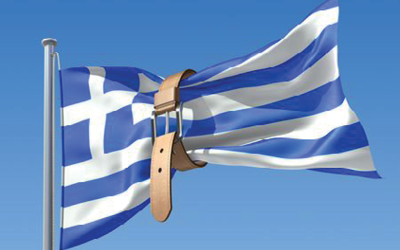At long last it appears the Greek debt crisis appears close to being resolved – for now. Prime Minister Tsipras has to go home with his tail between his legs, seeking parliamentary ratification of an austerity package that he was elected to oppose. The price for Greece getting the €86bn it needs to avoid default and remain in the Eurozone appears pretty high: more pension cuts, higher VAT and a €50bn bailout fund made up of state owned assets that have to be sold off.
The political price has been high for him as well given his government no longer has a majority, plus the country has to endure the ongoing scrutiny of the ‘troika’ (the European Central bank, The IMF and the European Commission). Not that we suspect many people will be terribly sympathetic toward the Greeks given their obviously profligate ways of the past.
More importantly though, what will be the ramifications of the deal for global financial markets? Other than a short-term bounce, very little, we believe.
It’s all about earnings
Global share markets have risen strongly today after the announcement that a Greek debt bailout deal is close to being signed. European markets were up between 1-2%, the U.S. markets also rose 1% and our market here in Australia is up 2%. Bond markets have been a little less enthusiastic, but then again, they usually are more tempered than their excitable equity cousins.
Why would we say we expect the resolution of the Greek debt crisis to have no enduring effect on financial markets? Surely the fact that markets have reacted sharply is proof it matters; surely the Eurozone staying intact is significant; surely there is more certainty which is good for global growth prospects?
The thing is it’s a well established fact that there is literally no correlation between GDP growth and share markets. That may sound counter intuitive, but what really matters to share prices is earnings growth. The brutal facts are that Greece, with a population of 11 million, accounts for about 0.25% of global demand. That’s just not enough to move the earnings dial for pretty much any stock market other than Greece’s own.
It’s similar to the U.S. debt ceiling crisis of 2013. At the time markets were all over the place on a day to day basis, with two pullbacks of more than 5% during the year, as the politicians waxed and waned and negotiations went down to the wire. Now we look back and it’s hardly a blip for the S&P500, which went up more than 25% over that year!
Groundhog Day
Unfortunately this crisis is far from over for the Greeks. As well as having to live with some pretty harsh austerity measures, it’s likely the problem has just been deferred for another day.
The deep structural economic changes demanded by the troika may well be instituted by the Greek parliament and make an enormous difference, but history is against them. The first recorded Greek debt default was 600 years BC and since gaining independence 200 years ago it has been in default for 90 of them!
The Greek economy is carrying way too much debt and by sticking with the Euro, they’ve denied themselves the one avenue of economic flexibility that may have made a genuine difference: a weaker exchange rate. Be prepared to go through this whole shemozzle again.
What’s our exposure to Greece
Greece represents 0.02% of the FTSE All World Index and is represented in neither the iShares MSCI EAFE ETF we use (ASX code: IVE) nor the iShares Europe ETF (ASX code: IEU). Nor does IFP have any exposure to Greece. So the sum total of our direct exposure to Greece is zero.
Focus on what really matters
For the average investor who takes a medium to long-term view of their portfolio, it can be a real challenge to maintain your focus on what really matters. We’re not saying you can close your eyes to everything that goes on around you, but likewise, it pays to remember the media seizes on stories like Greece (or China) and tends to catastrophize them. It pays to keep things in perspective, and if you can’t do it on your own, then get an adviser to help you.





